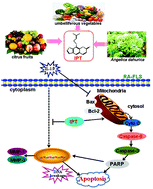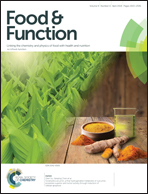Apoptosis effects of imperatorin on synoviocytes in rheumatoid arthritis through mitochondrial/caspase-mediated pathways†
Abstract
Rheumatoid arthritis (RA) is a systemic chronic inflammatory disease associated with a potential imbalance between the growth and death of rheumatoid arthritis fibroblast-like synoviocytes (RA-FLSs). Imperatorin (IPT) is a naturally occurring furanocoumarin found in umbelliferous vegetables, citrus fruits, and some herbs. The effects of IPT on the proliferation and apoptosis of RA-FLSs and its potential underlying mechanisms have remained unclear. RA-FLSs obtained from RA patients were induced by interleukin-1β (IL-1β) and treated with IPT. Cell viability was determined by MTT assay. Apoptotic cell death was analyzed by Annexin V-FITC/PI double staining and Hoechst 33342 staining. The loss in the mitochondrial membrane potential (ΔΨm) was visualized on the basis of JC-1 staining via fluorescence microscopy, and protein expression changes were assessed by western blot, whereas in vivo studies were conducted in male Wistar rats followed by histopathological assessment via TUNEL assay and HE staining of tissues. The results showed that IPT significantly reduced cell viability, accelerated cell apoptosis and decreased matrix metalloproteinases-1/-3 expression in IL-1β-induced RA-FLSs. Furthermore, IPT exposure was found to disrupt the ΔΨm compared to the IL-1β-induced treatment. Moreover, IPT increased the release of mitochondrial cytochrome C, the ratio of Bax/Bcl-2, and the cleavage of caspase-9, caspase-3 and poly (ADP-ribose) polymerase. In vivo studies showed that IPT not only significantly reduced the collagen induced arthritis by reducing synovial hyperplasia, and pannus formation but also enhanced the apoptotic index of ankle joint cells. Conclusively, our findings suggest that IPT inhibits cell proliferation and induces apoptosis in RA-FLSs that may be associated with mitochondrial/caspase-mediated signalling pathways.



 Please wait while we load your content...
Please wait while we load your content...